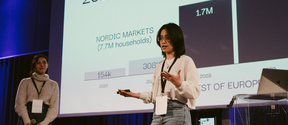CodeBus Africa tunes up for co-creation

Ask people from any country to name one thing that unites them across borders, and music will figure high on the list. So it makes perfect sense that the CodeBus Africa project focuses on this most universal form of cultural expression as a way of attracting young Africans, and especially young African girls, to learn more about computer coding.
Described as a ‘100-day adventure into creative technology and youth empowerment’, embracing ten African countries and extending from February to May 2017, the project is part of the official Finland 100 program, marking the centenary of Finnish independence.
The concept is to tour the ten countries with one-day workshops at selected schools, instructing youth in the basics of program coding which the children use to produce their own songs. Finnish educational technology start-up Mehackit is a partner in training the workshop instructors and providing the curriculum, which uses Sonic Pi open-source software. A prime aim is to show the students how technology is a part of everyday life – and to make that introduction a fun experience.
CodeBus Africa Project Lead Irena Bakic joined the tour from its opening sessions in Ghana and by early March had reached its third stop in Ethiopia, having held workshops also in Nigeria.
“What caught my interest when I applied to lead the project was the aspect of youth education and technology, and working with 30 different partners,” she says.
“It involves a huge network of leading technology hubs and NGOs that’s growing all the time.”
Sharing a laugh at Plan International’s Smartup Addis space. Participants code their songs in pairs to make the most out of peer-to-peer learning and support.
Combined resources
Irena Bakic’s graduate background at Aalto includes an interest and involvement in sustainable technologies, product development and co-creation, as well as working with young people. When she took the lead post at Aalto Global Impact in September 2016 the decision had been made to launch a project involving coding and African youth, but the details had still to be defined.
“Workshops were initially held to bring together the Ministry of Foreign Affairs and the Finnish embassies in Africa to discuss the project’s structure and aims. It was decided that it would make more sense to do something together rather than individual initiatives in each country, and Aalto was asked to be involved.”
“Aalto Global Impact was a natural fit for coordinating such an initiative,” says Vilma Hämäläinen, Communications Lead for CodeBus.
“We have partnered with African universities in multidisciplinary innovation projects in the past, and in CodeBus Africa we have the privilege of establishing further connections between African and Finnish innovators. The official theme of Finland 100 is Together, so the project fits it perfectly.
“We want to give youth a positive first experience in coding so that later in life they will be more likely to get involved. Programming can open a lot of doors and also serve as a creative outlet. We want to make it fun and rewarding.”
Although CodeBus is a university project in collaboration with the Ministry of Foreign Affairs, says Irena Bakic, it feels more like a start-up with its fast pace, range of partners, and variety of venues and environments.
“We contribute ten Aalto instructors, all of them students, working as volunteers,” she explains.
“They’re all trained in Finland by Mehackit, after which they share the training with up to six local instructors in each country. One of the best things as a project lead is to see how things proceed into teamwork so fast. There is something almost magical about this.”
Project Lead Irena Bakic shares experiences from the road with Ethiopia’s Minister of Science and Technology H.E. Dr.-Ing. Getahun Mekuria Kuma who attended a workshop in Addis Ababa.
Embassy support
The project involves taking 23 laptops in tow across ten countries, which presents some customs, documentation and security challenges. Irena Bakic gives the embassies special credit for their help in these practicalities, as well as their support in media coverage and attracting high-level ministry interest.
“We also hope to bring a richness to the picture of what Africa is,” she says.
“There are so many cultures and differences between the different countries which not everyone appreciates. And of course we want to put the emphasis on girls’ education. I don’t think there is a single country, including Finland, where girls and boys are equal in the field of technology. The aim is to have a minimum of 50 per cent girls participating in the workshops. In practice we are recording music, combining art and technology, showing the kids how you can pursue your own interests using technology.”
The project launch in Accra, the capital of Ghana, was a success on many levels, Vilma Hämäläinen reports. Cooperation with local partners went smoothly and the children were immersed and engaged in their task of creating music using coding.
“The kids were excited, and their teachers were also highly interested in our approach. The project also attracted the attention of many IT teachers who wanted to try out the curriculum in their own work.”
Individual responses from the children were positive.
“Today was interesting and a lot of fun,” was the verdict of Kehinde Omonayin, 14, of Abuja, Nigeria.
“I found it exciting because it has to do with music. My favorite part was the beats – the beats per minute!”
Her classmate, 15-year-old Mirabell Onovo, concurred: “I didn’t find it difficult at all! You just had to follow the instructions.”
“I have also been to computer summer classes where they taught us PHP 6, Microsoft, websites, Javascript, that kind of thing,” said Kehinde.
“So it was much easier for me here.”
Children highly motivated
South Africa will be the last stop on the CodeBus Africa tour in May 2017. Interviews are carried out with each local partner to ascertain their own expectations and anticipated benefits, an exercise that will be repeated after six months to help decide what the next concrete steps might be. Debriefings are also held in each country visited.
From a personal point of view, Irena Bakic has a clear idea of the project’s objectives.
“What I care about most is that the children feel like they’ve achieved something and that they have had fun. We know we can’t achieve miracles but we want them to have a great first experience of technology, to demystify coding. And we think everyone has the capacity to learn coding.”
Vilma Hämäläinen is similarly upbeat.
“I’m amazed at how quickly the children have picked up the basics. Their focus and motivation have pushed us to work harder and to make this an exciting project for everyone involved.”
Each workshop ends with a jamming party celebrating the youngsters’ learning efforts.
CodeBus Africa in a nutshell
• Part of the official Suomi 100 – Finland 100 independence anniversary program.
• Coordinated by Aalto Global Impact, promoting Aalto University’s societal impact globally through education, research and innovation.
• Visits ten countries over 100 days between February and May 2017: Ethiopia, Ghana, Kenya, Mozambique, Namibia, Nigeria, South Africa, Tanzania, Uganda, Zambia.
• Introduces youngsters in Africa to the basics of coding through music.
• Makes a special effort to involve girls, who are under-represented in technology around the world.
• Involves 10 Aalto students as volunteer workshop instructors.
• Instructor training and Sonic Pi workshop curriculum by Finnish start-up Mehackit.
• A joint effort between the Finnish Ministry for Foreign Affairs, Finnish Embassies in the ten countries, Nokia, Mehackit, and more than 15 local schools, institutes and technology hubs.
• Twitter and Instagram at @codebus_africa
Selam Kebede and Irena Bakic listen to the participants’ musical creations. Ms. Kebede, an Aalto alumna, serves as a Special Envoy for Finland 100 in Ethiopia.
This article is originally published in the Aalto University Magazine issue 19 (issuu.com), April 2017.
Read more news

Research reveals the economic significance of family firms in Finland
The findings show that, on average, family firms are more profitable and financially resilient than other firms – and also invest more.
Measuring urban nature: new habitat types and criteria support the prevention of biodiversity loss
A recent report introduces an anthropogenic habitat classification and assessment criteria that make it possible to visualize, measure, and compare nature in the built environment. These tools enable the assessment of ecological condition and support the development of green infrastructure and the prevention of biodiversity loss in cities.
NASA Reveals New Details About Dark Matter’s Influence on the Universe
With the Webb telescope’s unprecedented sensitivity, scientists are learning more about dark matter’s influence on stars, galaxies, and even planets like Earth.






